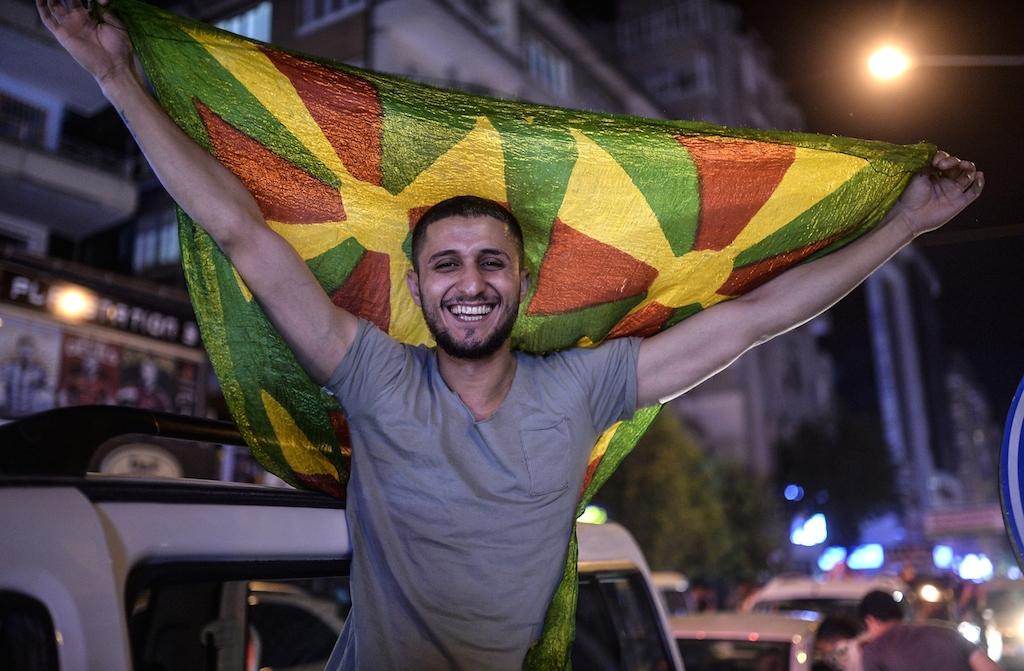In a historic shift, Turks elect Yazidis, Armenians and Roma candidates to parliament
A supporter of the pro-Kurdish Peoples' Democratic Party (HDP) holds a flag and celebrates in the streets the results of the legislative election, in Diyarbakir on June 7, 2015.
ISTANBUL, Turkey — When it became clear that a Kurdish-rooted party would enter parliament for the first time in Turkish history, Kurdish towns and neighborhoods across the country erupted with deafening joy, as cars honked and fireworks exploded late into the night.
But the Kurds weren’t the only winners in Sunday’s elections. As the results rolled in, many of the country’s ethnic and religious minorities realized that they too had reason to celebrate: the new parliament is set to be the most diverse in decades.
Turkey’s Yazidi (Ali Atalan and Feleknas Uca, HDP) and Roma (Ozcan Purcu, CHP) communities will be represented in Ankara for the first time. Other freshly elected MPs include Armenians (Markar Esayan, AKP, Selina Dogan, CHP and Garo Paylan, HDP), Syriacs (Erol Dora, HDP) and Alevis, as well as a record number of women.
After a closely fought election, Turkey faces a coalition government. President Erdogan’s Justice and Development Party (AKP) has lost its absolute majority, taking only 258 of the parliament’s 550 seats.
Meanwhile, the Kurdish-rooted Peoples’ Democracy Party (HDP) swept past the 10 percent threshold to gain 82 seats — with many reserved for members of Turkey’s ethnic and religious minorities.
“This is the collective victory of Kurds, Turks, Armenians, Arabs, Alevis, Sunnis, Christians, Yazidis, of all those who have been marginalized,” HDP co-chair Selahattin Demirtas told reporters on Sunday night.
In an attempt to broaden its support base, the HDP ran on a diverse platform this year, but the main opposition Republican People’s Party (CHP) and the ruling AKP also fielded candidates from minority backgrounds.
It marks a historic reversal. Toward the end of the Ottoman era, minorities entered parliament in large numbers. The 1908 parliament included 26 Greek Orthodox, 14 Armenian and four Jewish MPs.
In the Republican era, however, Turkish politics and society became increasingly homogenous: non-Muslim minorities, who once formed a fifth of the population, now make up less than one percent. Between 1923 and 2015, only 24 non-Muslims won seats in parliament.
Yet in the new parliament, one Syriac MP and three Armenians will represent Turkey’s remaining 100,000 Christians.
“This is a very important development. We haven’t seen an Armenian in parliament for years,” said Yetvart Danzikyan, editor of the Turkish-Armenian newspaper Agos.
The last Armenian parliamentarian, Berc Sahak Turan, stepped down in 1964. Since then, Turkish-Armenian relations have taken a turn for the worse.
Anti-Armenian rhetoric in Turkey flared up this year in the run-up to the genocide centenary in April and has shown little sign of abating: on the campaign trail, President Erdogan repeatedly railed against what he perceived as an “Armenian lobby” — even though one of the Armenian MPs is a candidate from Erdogan's own party.
To be represented in parliament this year was a welcome surprise for the small community. Serkan Saritas, who runs an Armenian-Alevi center in the eastern Anatolian province Tunceli, said: “To have three Armenian MPs from three different parties for the first time since Berc Sahak Turan’s tenure is a joyful thing for us.”
Danzikyan said the Armenian community has high expectations and are hopeful that their concerns might be addressed in parliament. However, he was cautious, warning: “We will see if it lasts, or if it will be over within a few months.”
Turkey could face snap elections this summer if the parties are unable to agree on a coalition government. Some AKP officials — and several pro-government newspapers — have already floated the idea of a new election.
Erdogan and the AKP rose to power in 2002 with an inclusive agenda, introducing a series of reforms strengthening minorities’ cultural rights. These days, though, the party and its leaders are opting for increasingly nationalist and polarizing rhetoric.
Trying to win support among conservative voters, Erdogan sought to depict the HDP as an ungodly potpourri of atheists, Armenians and gays during the election campaign.
“If the prominence of non-Muslims in the HDP list underlined its commitment to diversity, non-Muslim representation for the AKP felt more like window-dressing, especially given the prominence of anti-Armenian and anti-Semitic rhetoric during the election,” said Howard Eissenstat, Turkey specialist at St Lawrence University, New York.
“In the end, this new representation is a powerful symbol, but if the new government doesn’t show greater commitment to diversity and inclusion, it won’t mean a lot.”
Others are more optimistic. Ali Atalan, an HDP candidate in Batman, and Feleknas Uca, also running for the HDP in Diyarbakir, became Turkey’s first Yazidi MPs on Sunday. Having previously worked as a politician in Germany, Atalan said he returned to Turkey to fight for minority rights.
“Never in all of Yazidi history did we have the opportunity to have a representative in parliament,” he told GlobalPost by phone from Batman, as cars were heard honking in celebration.
“If all religions and all ethnicities are seen to live side by side in this country, it will have an influence on democratic developments in the entire Middle East. We can be a role model.”
Turkey’s tiny Yazidi minority swelled to around 32,000 after tens of thousands of Iraqi Yazidis fled the Islamic State’s advance on Mount Sinjar last year.
While Atalan pledged to pay special attention to Yazidis’ concerns, he stressed that he would fight for the rights of all.
“We want all peoples, Turks, Kurds, Yazidis, Alevis, Christians to live here as brothers, as siblings, equal in freedom and rights,” he said, adding: “We hope the AKP will join us in this cause to create a peaceful and democratic country.”
We want to hear your feedback so we can keep improving our website, theworld.org. Please fill out this quick survey and let us know your thoughts (your answers will be anonymous). Thanks for your time!
